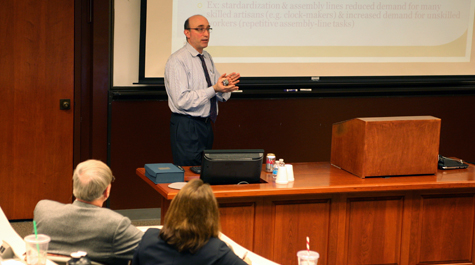Kades Addresses Growing Rich-Poor Gap in Annual Tucker Lecture
A large crowd was on hand Thursday, January 31, when William & Mary Professor of Law Eric A. Kades presented the 2013 St. George Tucker Lecture at William & Mary Law School. The event was co-sponsored by the William & Mary Property Rights Project.
Kades’s talk focused on “The New Feudalism.” Based on his latest book-length research, he examined not just income inequality in America, but a diminishing range of life experiences and life chances, and the growing class divide in the United States. He also focused on the tension of legal changes that enable dynastic wealth and the longstanding dangers of feudalism.
“Class lines are sharpening in America today,” said Kades, a nationally known expert on property rights and economic development. “Even more worrisome,” he said, “the social and legal regimes that put the American dream within the reach of generations of Americans are under sustained, well-financed assault.”
Following Kades’s lecture, Emeritus Professor James W. Ely, Jr., provided commentary. Ely was the Milton R. Underwood Chair in Free Enterprise, a professor of law, and a professor of history at Vanderbilt University.
The William & Mary Property Rights Project honored Ely in 2006 with the Brigham-Kanner Property Rights Prize, which is awarded annually to an individual whose work affirms that property rights are fundamental to protecting individual liberty.
Responding to Kades’s work, which he called “informative and provocative,” Ely noted that income inequality has long been a feature of American history – as have complaints about income inequality and social mobility. Both he and Kades answered questions from the audience after the talk.
The St. George Tucker Lecture Series was established in 1996 to recognize the scholarly achievements of a senior member of the William & Mary law faculty. The series is made possible through the generosity of alumni, and this year’s lecture was co-sponsored by the W&M Property Rights Project.
“Kades has ably advanced a challenging thesis, and I’m sure he is not surprised to find he has aroused some debate,” Ely said. “His forthcoming book will certainly promote dialogue over some of these important issues, which is ultimately, I think, the best possible accolade for a scholar.”